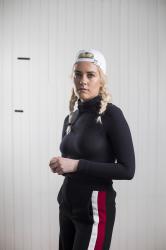
As a flicker of light appears at the end of the pandemic tunnel, we sat down with the next generation of Icelandic artists to discuss the future. The conversations were freeform—some focused on the upcoming years, others reflected on realisations from the past months, others still looked with wide-eyes at the future of the scene, which has only grown within the restrictions of the coronavirus.
Presenting, an artistic vision of the future, as told by the future. Today, we talk to Ýmir Grönvold.

Ýmir Grönvold. Photo by Art Bicnick
Ýmir Grönvold
Ýmir Grönvold spent the first six months of the pandemic in Kathmandu, Nepal helping his uncle undergo alternative rehabilitation therapy. “We got locked down there and then we ended up staying,” he notes softly; his voice crisp and light. “It was interesting because it’s the most polluted city in the word, but after a few days of lockdown, you could see the mountains again.”
The problem of ego
Ýmir’s works are playful—large scale paintings highly connected to nature in a rather uplifting, innocent way. In Nepal, he became acquainted with thangka, a special breed of Buddhist paintings. “They are usually made by a lot of people. No one person takes credit,” he explains. “That was a really big cultural difference. We’re so ego-driven in the West. If you’re an artist, it’s more about you, or at least that’s how I sometimes see it, but it was really beautiful to see these collaborative paintings and no one person taking credit…”
Almost fittingly—or perhaps the opposite of fittingly—his next exhibited piece will be an appropriated sculpture for the ‘Raw Power’ exhibition at Hafnarhús, which puts Erró’s work in dialogue with young artists. Ýmir made the piece three years ago, but it’s uncanny to hear an artist jump from appropriated to uncredited art in but a few minutes. I suppose they are but opposite approaches to the same problem: ego.

Artwork by Ýmir Grönvold.
Stay calm
Ýmir is calm. Everything he says seems to come both from the heart and off the cuff while also seeming incredibly well thought out. It’s weird to think about him even grappling with the problem of ego. According to Ýmir, 2020 has been a year of personal growth. He wasn’t always so centered.
“I can sympathise a lot with people and I understand that some people are having a crisis because of the situation, but when people say like 2020 sucked, it’s like ‘what are you talking about? What do you mean?’ I think people really think they need to control everything,” he says. “And when you are forced to experience yourself—your own thoughts and everything—it’s understandable that some people can suffer.”
For Ýmir, the cure was mindfulness. “There is a shift that happens in people’s consciousness. That’s why all these monks are meditating, why people do this stuff because there’s a shift that happens in people when their presence becomes the forefront of their life—not the person they think they are, but who they actually are,” he explains.
Ýmir hopes the pandemic will push more people down the path of being more present. “My feeling is that more people are more conscious,” he explains. “More and more are becoming vegan. There’s more sensitivity to other’s feelings. But maybe that’s just totally my world.”

Artwork by Ýmir Grönvold.
Check out Ýmir Grönvold on Instagram.
Note: Due to the effect the Coronavirus is having on tourism in Iceland, it’s become increasingly difficult for the Grapevine to survive. If you enjoy our content and want to help the Grapevine’s journalists do things like eat and pay rent, please consider joining our High Five Club.
You can also check out our shop, loaded with books, apparel and other cool merch, that you can buy and have delivered right to your door.
Buy subscriptions, t-shirts and more from our shop right here!















